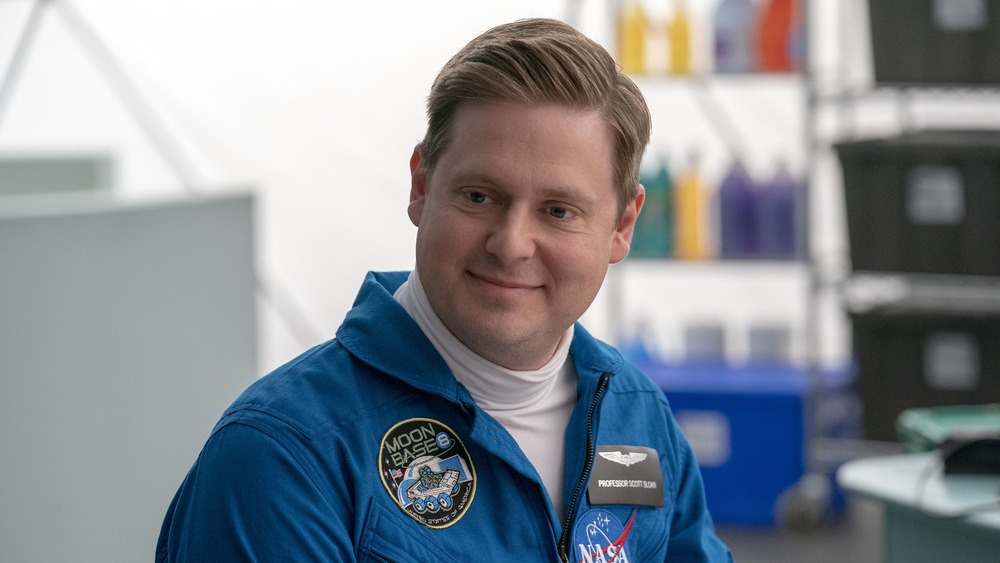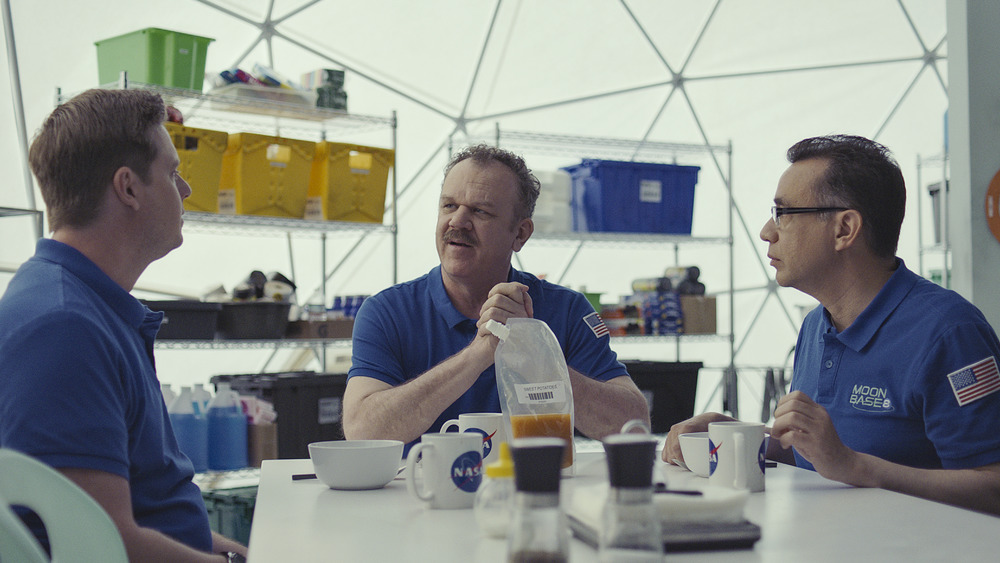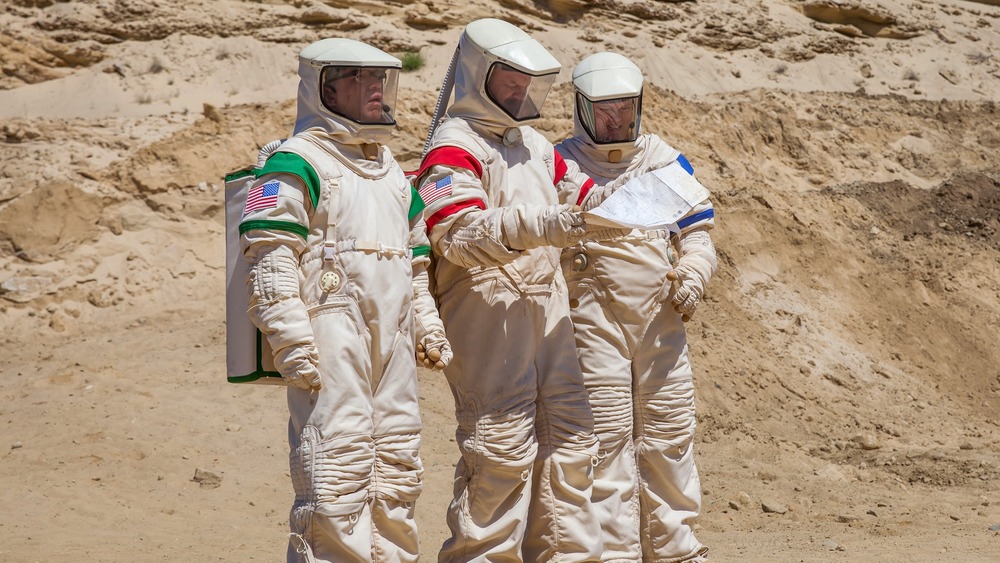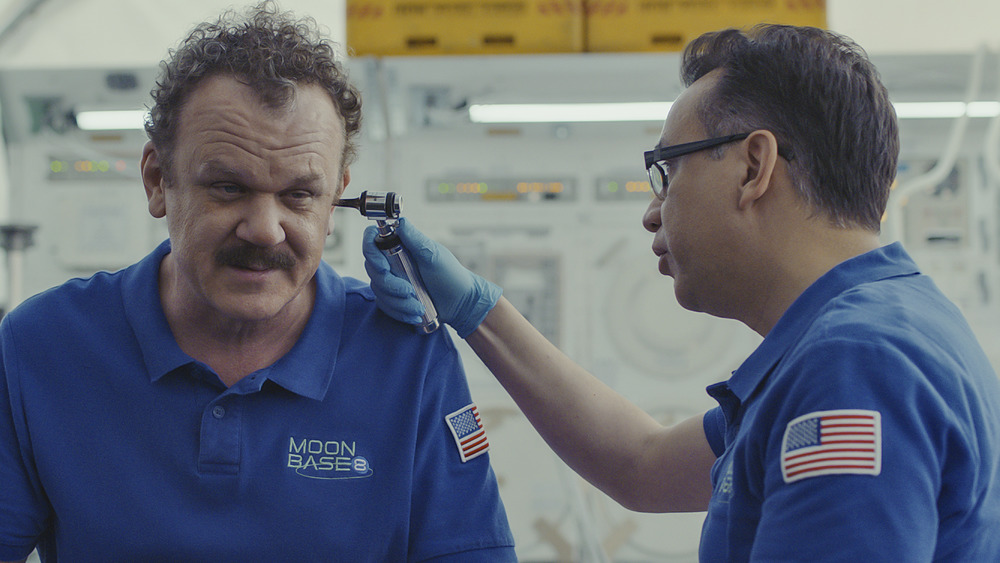Tim Heidecker Talks Moonbase 8, Improv, And Being Friends With John C. Reilly - Exclusive Interview
Actor, director, writer, and musician Tim Heidecker is a multitalented comedic force who also has deep roots in stand-up and sketch comedy. Together with Eric Wareheim, we saw his diverse skills for five seasons on Adult Swim's Tim and Eric Awesome Show, Great Job!
On Showtime's Moonbase 8, Heidecker plays Professor Scott "Rook" Sloan, a clean-cut Christian who wants to spread the gospel to the universe. He stars alongside John C. Reilly as Robert "Cap" Caputo, and Fred Armisen as Dr. Michael "Skip" Henai. The three astronauts are living together in a NASA space substation in the Arizona desert, hoping to get selected for the real deal — a stay in the program's actual station on the moon.
Mostly alone in their dome, their respective, marked personality traits can't be contained. That type of close-quarter living leaves little room for privacy. While they drive one another a little crazy, they also start to form a unique bond. In the mixed bag of moods and emotions their live-work scenario creates, there's a lot of hilarity and plenty of heart.
In a Looper exclusive interview, we talked with Heidecker about how the show was created and developed, along with the cast and crew's working relationships, ideas that didn't make the final cut, and what the stars hope sticks with audiences from the series.
Tim Heidecker explains how leaving room for improv shaped Moonbase 8
You, Fred Armisen, and John C. Reilly are all credited with writing Moonbase 8, along with Jonathan Krisel. How did the idea take shape?
Well, I'm very close with John Reilly and I had worked with Fred before and we had a nice rapport, friends. And I was doing an episode of Portlandia, just a little cameo. And this has always happened in the years of hanging out with Fred — it's just hard to describe. He's just really one of the funniest people, off camera, more so than he is on camera, even. But we have this thing where we just joke around and do bits and make up things. And I said to Reilly, "Man, I'm with Fred Armisen right now. And we're just having a blast." And John said, "Man, Fred and I've always tried to do something together and it always falls apart or something."
It needed to happen.
I said, "Well, let's try to do something, the three of us. What could we do that would basically throw the three of us in the same room together almost by force? Are we in prison together? Are we in the army together?" And so we just worked through different scenarios. And John Reilly had this interest in the idea of these people that go to Antarctica and live there for months on end. And he noticed in between the lines that there was a lot of interesting potential for comedy as people lose their minds a little bit. So that's how it started. We thought about who we'd want to do this with, and Krisel was the first name with thought of because we had all worked with him and he really understands us. He also understands how to deliver a good-looking show that works for a greater audience than our group.
In writing Moonbase 8, did you leave a lot of room for improv? And if so, how much of that got used in the final scenes?
We left room for improv. We wrote pretty tight scripts, but we always knew that in every episode there would be two or three scenes that are going to have a circle around them saying, "This is a good place for us to just be ourselves or be our characters and improvise, have fun, forget the script, just talk and find little improv avenues or arteries." But we also wanted the stories to be well told or good enough that you are interested to see how things turn out. So there was certainly a story that we shot in a more traditional way. It was a mix. It was always open for improv, but also really keeping, Krisel does a very good job of letting us know that something is really funny but that we need to bring up other points so the story makes sense.
The cast of Moonbase 8 likes to keep things subtle
The show is hilarious and often very subtle. Was that intentional?
Yeah. I mean, that's just what we love. I think a lot of that is in the editing and our editors just never get enough credit, but they're the ones that are always surprising us, finding that one take where one of us just, you're right, does these little subtle things that you don't see in maybe a more traditional comedy. So that's partly their responsibility, but we trust each other a lot and know that none of us, I think, wanted to overdo it, or ham it up or make something that felt really broad and unbelievable. So we just trusted that the small, nuanced, granular comedy that we like in a lot of British humor was going to be the thing that helped us make the kind of show we wanted to make. And not just for us, but we were making the show we wanted to watch.
The relationships between the three main characters are complex. Certainly, a mostly-isolated living situation will breed weirdness. What do you all hope people will get from the relationship between Cap, Rook, and Skip?
Well, I think one of the things is that these guys wouldn't probably get along in the normal world. They don't have a lot of similar interests or anything. What's funny to us, though, is that they can get along as a performance, as a way to show NASA — their bosses — that they can cooperate with each other. But then throughout the show, you sense that they start clicking a little bit on an actual human level. So there are some Odd Couple-style dynamics — we probably aren't meant to get along, but we're actually growing closer because of this experience.
Throughout the series, we get glimpses of the characters' lives outside the substation, and it's intriguing. As the show evolves, will we get more of that?
I think so. I mean, I hope we get to make more. I look at the six episodes because of the way we made it, we made it on spec with A24. We just went off and shot six episodes. We didn't go through the network development, pilot process. And so I look at it as a six-episode pilot, or that we just went in, dove in. And we had a fairly, compared to other shows, had a fairly small budget. So, I think as I start imagining a second season, I would love to break out of the dome and flash back to show their lives outside of that world a little bit. There are satisfying moments in these six episodes where you're not looking at them in the dome — like when Cap is in the RV — so mixing in more in a second season would be fun. I'd like to get into things that show the process of these guys getting into the program and what that was like. It might get too claustrophobic staying in the dome all the time.
Definitely. Being that these three are obviously a bit subpar in comparison to their peers, you can't help but wonder how they got into the program in the first place.
Yeah, I think there's a little suspension of disbelief that has to go along with comedy, but in general, you want to amp things up. I think at the end of the season, you see there's this, I don't know, maybe it's too subtle, but there's a sense that they're being watched and that's maybe a sign of what the true intentions of that particular moon base operation is.
Right. That maybe it's all a layer of an experiment that we're not yet privy to. Was it fun to play in outer space, even if it's just a mock space scenario?
It was fun. Just by surrounding ourselves in it and doing our research, and we visited a couple of places like NASA's Jet Propulsion Laboratories, which is right out here in Pasadena. And we went to SpaceX and they were both just neat. What I think comes across in the show is we don't try to be cynical or disparaging of the idea of going to space. There's a romanticism about it that I think comes across and I'm glad we're not making fun of the idea of it. It's cool.
Tim Heidecker dishes on how fun it is to work with friends
Did you write anything for this season or any jokes or anything that didn't make it onto the show?
Sure. There's always tons of stuff that gets left and cut. I had this original idea that I want to do one day — I always thought it'd be funny if they just had one piece of music that they could only ever listen to. There was this particular record by the Beach Boys in the '70s called Beach Boys Love You. And it's really an album that was made by somebody going through a full psychotic breakdown. And it sounds that way. It sounds crazy. And I thought that'd be cool if that were the only soundtrack to the show — if that record was the show's score. That's a cool idea, conceptually, but that probably wouldn't fly for more than a couple of minutes. It just wouldn't be funny as an idea, but the score that we have from Steven Drozd from the Flaming Lips is so great. There's so much emotional work that he does that is better than my smart-ass joke.
We have to know — have you thought about how Dr. Steve Brule would be handling the pandemic?
We've been talking about it a lot. He would, of course, pronounce it "The Crovid" and instruct people to do things like, "Wash your hands, you dummy." It would definitely be handled poorly. That's usually the funny thing about Brule — the arrogance. He's so dumb, but then there's this arrogance. He'd say "I know, I know what disease is." And of course, he'd get [COVID] and be fully arrogant about it. He'd get it badly and have terrible coughing fits.
You and John C. Reilly have worked together a lot over the years.
Yeah, it's great. He's a really good friend and very supportive. He's very supportive of me and encouraging and he's done it all really. He's done the great big movies. He's done small movies and he's so famous. We forget. He's also so recognizable that he's so beloved by people that I just am grateful he likes to do the weird stuff with us, with Brule and this show. But this show really comes a lot from him and his soul. He's got a beautiful Irish soul that a lot of the heart in the show is coming from him.
The show has a lot of heart, mixing some sadness in with the comedy. It has a lot of layers.
I find that everything I do, I learn what I'm doing by actually doing it and reflecting. You don't really know what you're doing until you're done doing it. I think there was really good feedback from A24 and Krisel and everybody saying, "Well, this shouldn't just be the Three Stooges. This should feel like you care about these guys." And those kinds of choices were made early on and reflected the way we wrote the scripts and tried to be somewhat consistent with the way characters behave and all that stuff, basic stuff. But I think it really was a mix of the editing and the score and the performances that give it that emotional feeling that really reveals itself after you've really made it.
Kansas City Chiefs tight end Travis Kelce was in the first episode. Where did that idea come from?
Yeah. We had this idea of a character that was going to be a fourth person that doesn't make it into the second episode to pull the rug out from the audience a little bit. But we had this idea of a sports star who you might see on the front of a Wheaties box and just the idea that NASA would be really thinking about their PR. We didn't really know Travis that well, but he was interested. He has such an impressive physical presence. And he turned out to be great. And I didn't realize, I mean this was a few years ago. It was before he won the Super Bowl, so we got him at discount. I mean, you don't know how big a player is going to be right away, but people love it. People love these guys and love seeing them out of their normal habitat.
What else are you working on?
I've had a bunch of stuff come out this year. My standup special An Evening with Tim Heidecker is on YouTube. Also, my album Fear of Death came out in September. So right now I'm feeling like I need to go away for a while and feed the creative trolls in my brain and come up with some new stuff.



